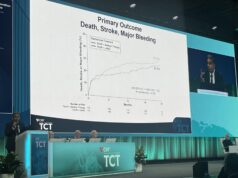
A randomised trial comparing transcatheter tricuspid valve replacement (TTVR) with the Evoque system (Edwards Lifesciences) to medical therapy in patients with severe tricuspid regurgitation—TRISCEND II—has demonstrated “meaningful improvements in functional status and symptoms” at six months.
This was the headline finding presented by Susheel Kodali (Columbia University Medical Center, New York, USA) during a late-breaking clinical trial session at the 2023 TCT meeting (23–26 October, San Francisco, USA), in which he presented the first tranche of data from 150 patients.
Kodali previously presented six-month findings from TRISCEND—the single-arm study of the device—at TCT 2021 where he reported a significant reduction in TR severity as well as significantly improved functional and quality-of-life outcomes among patients who received the therapy.
TRISCEND II, the multicentre, randomised pivotal trial comparing the device to medical treatment, has enrolled a total of 400 patients and was designed as a two-part study with initial safety and efficacy endpoints presented at six months. Full echocardiographic and clinical data will be analysed at one year including the full patient cohort, and Kodali said that these data are expected in the coming year.
Kodali’s presentation detailed the initial phase of the US Food and Drug Administration (FDA) breakthrough device trial, including a primary safety endpoint of major adverse events (MAE) at 30 days, and an effectiveness endpoint comprising TR grade reduction and including changes in Kansas City Cardiomyopathy Questionnaire (KCCQ), New York Heart Association (NYHA) classification and six-minute walk test (6MWD).
Kodali reported that the valve was successfully implanted in 95.8% of enrolled patients and that the trial met all primary endpoints with an MAE rate at 27.4% at 30 days, as well as a significant TR grade reduction with 98.8% of patients achieving ≤ moderate TR and 93.8% achieving ≤ mild TR at six months. Additionally, Kodali reported that there were superior quality-of-life and functional outcomes at six months for the composite endpoint including KCCQ, NYHA and 6MWD for the EVOQUE system plus medical therapy over medical therapy alone.
“We are excited by the safety and effectiveness data from the first 150 patients of the TRISCEND II pivotal trial,” said Kodali. “With no predicate study of a novel transcatheter tricuspid valve replacement, these data and outcomes give us great hope in the EVOQUE system as an option to treat patients who are very sick and have few effective therapeutic options.”
An FDA advisory committee meeting of the Evoque system is expected in January 2024, followed by an anticipated US approval in mid-2024, Edwards Lifesciences has stated. The device received FDA breakthrough designation in 2019, and received CE mark for the transcatheter treatment of eligible patients with TR this month.










